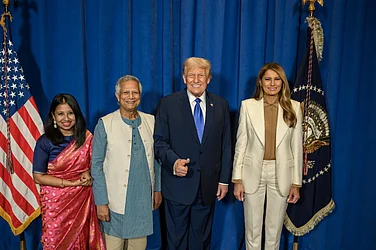The year 2024 promises to be an important year for global democracy, with at least 64 countries holding national elections that will shape the futures of these nations. These elections cover nearly half the world's population, making 2024 perhaps the most consequential election year in history.
Some of the major polls include Taiwan's presidential race that impacted Beijing's stance on self-governance, as well as high-stakes elections in India, Bangladesh, Pakistan, Russia, Ukraine, Britain and the United States - though many countries lack full democratic freedoms.
In Bangladesh, opposition parties face suppression amid a crackdown on dissent. Russia's election, while virtually certain to extend Putin's reign, may hint at his waning domestic support amid the Ukraine war. Ukraine itself faces uncertainty around holding a presidential vote under martial law. Britain's economic woes suggest a potential change after 14 years of Conservative Party leadership.
But the U.S. presidential election could prove most consequential globally. The U.S. election will take place in November amid the backdrop of these other pivotal votes across Europe, Asia and beyond that will test democracy's resilience worldwide. With rights and freedoms at stake in some major countries, 2024 will be a defining year for self-governance internationally.
Election that'll Affect the World
Presidential Elections of the United States of America
The USA has a population of 341 million people, and the next presidential election will take place on November 5.
The presidential election of the States is shaping up to be a pivotal event with far-reaching global implications. As the world's leading superpower, the policies and priorities of the next American administration will undoubtedly have ripple effects across globally.
One of the key areas to watch is the US approach to climate change and environmental regulations. A shift in the White House's stance could significantly impact global efforts to combat climate change and drive sustainable practices. Economic policies, including trade agreements, tariffs, and economic relations with major powers like China, will be closely scrutinised for their potential ramifications on the global economy.
The new administration's foreign policy agenda, particularly its approach to long-standing conflicts, alliances with NATO and other partners, and its dealings with adversaries like Russia and North Korea, will shape the geopolitical landscape. Any changes in the US's position on issues such as the Iran nuclear deal or the Israeli-Palestinian conflict could trigger regional shifts.
Moreover, the outcome of the election could influence America's global leadership role and its commitment to international institutions like the United Nations, the World Health Organization, and the World Trade Organization. A more isolationist or protectionist stance could undermine multilateralism and global cooperation on critical issues.
General Elections of India
As the world's largest democracy and a rising economic powerhouse, the outcome of India's 2024 general elections will have significant global ramifications. The policies and priorities of the next elected government in New Delhi will influence not just the nation's 1.3 billion citizens but reverberate across the international sphere. The elections are expected to take place in April - May.
On the economic front, India's trajectory as a key player in global trade, investment and supply chains will be closely watched. Any shifts in its economic policies, particularly towards major trade partners like the US, China and the EU, could impact worldwide commerce and financial flows.
The new administration's stance on climate change will also be pivotal, given India's massive energy demands and its role in global climate negotiations.
Geopolitically, India's relations with neighbours like China and Pakistan, as well as its positions on issues like the Russia-Ukraine conflict, will have consequences for regional stability and global security dynamics. The country's engagements with plurilateral forums like the Quad and BRICS could also see recalibrations.
From matters of international security and non-proliferation to global cooperation on public health, technology governance and beyond, the new Indian government's worldview will carry significant heft.
Europe Union
The 2024 European Parliament elections will serve as a crucial barometer of the political currents sweeping across the 27-nation bloc. The outcome will have profound implications, not just for the dynamics within the EU but for its global stature and influence.
A potential shift towards more populist, euroskeptic parties could trigger an existential crisis for the EU, undermining its long-standing commitment to integration and open borders. Such a political fragmentation could weaken the EU's position on the world stage and its ability to spearhead a unified foreign policy approach.
Conversely, a renewed mandate for pro-EU, progressive parties would reinvigorate the bloc's role as a champion of liberal democratic values, human rights, and global cooperation on issues like climate change and multilateralism.
Beyond its borders, the EU's economic policies significantly impact global trade and financial systems. A more protectionist EU economic agenda in the aftermath could disrupt longstanding trade partnerships and investment flows worldwide.
The European Union's robust support for Ukraine and punitive measures against Russia over the invasion have cemented its position as a counterweight to Russian aggression. Any recalibration of this stance could upend the geopolitical dynamics surrounding the conflict.
Russia
The 2024 Russian presidential and parliamentary elections will be closely watched globally, given Russia's status as a major military and economic power with an increasingly assertive foreign policy stance. The outcome will have profound implications for international security and geopolitical dynamics.
If President Vladimir Putin or his allies consolidate power further, it could embolden Russia's belligerence on the world stage. An emboldened Kremlin may choose to escalate the Ukraine conflict or flex its muscles against NATO nations, raising tensions across Europe. It could also intensify support for regimes in countries like Syria, deepening instability across the Middle East.
Moreover, Moscow's position on cybersecurity, arms control, space militarization and climate change will impact multilateral efforts to address these global challenges. Russia's participation in bodies like the U.N. Security Council could also see policy resets.
Ukraine
The 2024 elections in war-torn Ukraine will be a pivotal moment, with far-reaching global consequences. As the nation continues to defend itself against Russian aggression, the policies of the newly elected leadership will significantly impact the trajectory of the conflict and broader geopolitical dynamics.
A victory for pro-Western, staunchly anti-Russian forces could intensify Ukraine's alignment with NATO and the European Union, straining relations with Moscow further. These risks prolonging the conflict and increasing regional instability, with ripple effects on global security.
Conversely, if more Russia-friendly parties gain ground, it could open potential pathways for negotiated peace settlements, though at the cost of diminishing Ukraine's sovereignty and territorial integrity - an outcome the West is unlikely to accept.
Beyond its immediate neighbourhood, the fate of Ukraine will test the resolve of democratic nations worldwide in upholding the rules-based international order against authoritarianism and territorial aggression. Continued military and economic support to Kyiv could become a litmus test for global powers.
The election outcome could also significantly impact vital supply chains, particularly for agricultural commodities like grain and sunflower oil, on which many nations depend. Energy markets too may witness disruptions depending on developments in this conflict.
Elections in Other Countries
Several other countries are also going to face or have already faced elections this year.
Indonesia:
Elections - Presidency, Regional Representative Council, House of Representatives (Feb. 14)
Pakistan:
Elections - National Assembly (Feb. 8)
Bangladesh:
Elections - National Parliament (Jan. 7)
Mexico:
Elections - Presidency, Senate, Chamber of Deputies (June 2)
Iran:
Elections - Islamic Consultative Assembly, Assembly of Experts (March 1)
United Kingdom:
Elections - House of Commons (expected in 2024, required by Jan. 28, 2025)
South Africa:
Elections - National Assembly (expected May-August)
Republic of Korea (South Korea):
Elections - National Assembly (April 10)
Algeria:
Elections - Presidency (expected in December)
Ukraine:
Elections - Presidency (scheduled March 31, may not occur due to martial law)
Uzbekistan:
Elections - Legislative Chamber (expected in October, due by December)
Ghana:
Elections - Presidency, Parliament (Dec. 7)
Mozambique:
Elections - Presidency, Assembly of the Republic (Oct. 9)
Madagascar:
Elections - National Assembly (due by May)
Venezuela:
Elections - Presidency (expected in December)
North Korea:
Elections - Supreme People’s Assembly (April 10)
Taiwan:
Elections - Presidency, Legislative Yuan (Jan. 13)
Syria:
Elections - People’s Assembly (TBD)
Mali:
Elections - Presidency (scheduled for February, junta postponed indefinitely for “technical reasons”)
Sri Lanka:
Elections - Presidency, Parliament (TBD)
Romania:
Elections - Presidency, Senate, Chamber of Deputies (expected November - December)
Chad:
Elections - Presidency (expected in October)
Senegal:
Elections - Presidency (Feb. 25)
Cambodia:
Elections - Senate (Feb. 25)
Rwanda:
Elections - Presidency, Chamber of Deputies (July 15)
Tunisia:
Elections - Presidency (expected in fall)
Belgium:
Elections - Chamber of Representatives (June 9)
Dominican Republic:
Elections - Presidency, Senate, Chamber of Deputies (May 19)
Jordan:
Elections - House of Representatives (expected in November)
South Sudan:
Elections - Presidency, National Legislature (expected in December)
Czechia:
Elections - Senate (TBD)
Azerbaijan:
Elections - Presidency (Feb. 7)
Portugal:
Elections - Assembly of the Republic (March 10)
Belarus:
Elections - Chamber of Representatives (Feb. 25)
Togo:
Elections - National Assembly (expected in early 2024)
Austria:
Elections - National Council (expected on Sept. 29)
El Salvador:
Elections - Presidency, Legislative Assembly (Feb. 4)
Slovakia:
Elections - Presidency (TBD)
Finland:
Elections - Presidency (Jan. 28)
Mauritania:
Elections - Presidency (June 22)
Panama:
Elections - Presidency, National Assembly (May 5)
Croatia:
Elections - Presidency, Parliament (presidential election expected in December; date of parliamentary elections TBD)
Georgia:
Elections - Presidency, Parliament (parliamentary elections on Oct. 26; date of presidential election TBD)
Mongolia:
Elections - State Great Khural (expected in June)
Uruguay:
Elections - Presidency, Senate, Chamber of Representatives (Oct. 27)
Republic of Moldova:
Elections - Presidency (expected in November)
Lithuania:
Elections - Presidency, Seimas (presidential election on May 12; parliamentary elections on Oct. 13)
Botswana:
Elections - National Assembly (expected in October)
Namibia:
Elections - Presidency, National Assembly (TBD)
Guinea Bissau:
Elections - Presidency (TBD)
North Macedonia:
Elections - Presidency, Assembly (presidential election on April 24; parliamentary elections on May 8)
Mauritius:
Elections - National Assembly (TBD)
Comoros:
Elections - Presidency (Jan. 14)
Bhutan: Population - 0.79M
Elections - National Assembly (January 9)
Solomon Islands:
Elections - National Parliament (expected in April)
Maldives:
Elections - People’s Majlis (expected March-May)
Iceland:
Elections - Presidency (June 1)
Kiribati:
Elections - Presidency, House of Assembly (TBD)
San Marino:
Elections - Grand and General Council (expected in December)
Palau:
Elections - Presidency, Senate, House of Delegates (Nov. 12)
Tuvalu:
Elections - Parliament (Jan. 26)


























